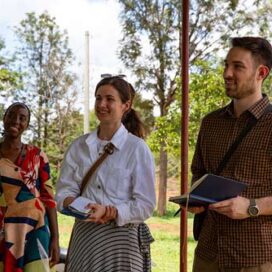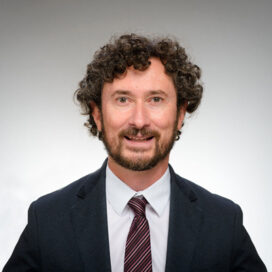Rebuilding Ukraine’s Future
MBA students visit Poland to help establish UCU center in Wroclaw
Published: July 11, 2023 / Author: Brendan O’Shaughnessy and Paige Risser

Meyer Business on the Frontlines team in Poland.
Since Russia invaded Ukraine in February 2022, the University of Notre Dame has expanded its academic, religious and cultural partnerships with the Ukrainian Catholic University (UCU) in Lviv. In March, 12 Notre Dame MBA students and four UCU counterparts traveled to Wroclaw, Poland, to advise UCU on how to set up a cultural center for Ukrainian refugees there.
This trip was offered as part of the Mendoza College of Business interterm week — an intensive mid-semester course where teams of students work with companies or nonprofits on a specific challenge. For the first time, the spring 2023 interterm projects expanded to include projects in Mexico City, Dublin, London and this one in Poland.
Students aimed to help UCU strengthen its center in Wroclaw, which generally would be similar in purpose to a Notre Dame Global Gateway in encouraging global collaborations and scholarship. While UCU has a center in London, the university only has one employee in Wroclaw. Figuring out what the new center could accomplish there was the central challenge of the interterm project.
“The scope of this project was for UCU to set up a foundation in Wroclaw to help these refugees adapt to Polish society, but also from the other lens, too – it’s how do you help Polish citizens welcome the Ukrainian refugees?” said Jack Joswick (MBA ’23). “How do you handle that tension and pull between the different parties, but have a center like this actually be beneficial to everyone?”
Joswick grew up in Kalamazoo, Michigan, and studied finance at Michigan State University. He worked for a large medical tech firm in his hometown before deciding he wanted to get an MBA to change his focus to marketing. He chose to go to Poland to embrace the values of Notre Dame and “use the talents and skill sets gained here to help a community that’s in dire need.”
“The Poland interterm was a way for Notre Dame and UCU to learn about each other a little bit, to build a relationship and for our students to be of service,” said Joe Sweeney, academic director of the MBA program and assistant teaching professor of Management & Organization, who led the trip. “At some point, the fighting will stop and there will be a whole country to build a new Ukraine. We’re starting to think about that already and what that could look like.”
Sweeney teaches in the College’s Meyer Business on the Frontlines Program, which offers unique experiential learning courses where students utilize the dynamic skills of business to address issues including post-conflict rehabilitation, poverty, illicit economies, isolation and prejudice. The trip served as an opportunity to explore projects for future Frontlines teams who conduct more in-depth research as part of their innovative approach to problem solving in post-conflict countries and regions.
Wroclaw in southwestern Poland, the third-largest city in the country, already has a large population of Ukrainian refugees. The city’s 1,000-year history speaks to the fluidity of borders in the region; it’s been part of Prussia, Bohemia, Hungary, Austria and Germany before returning to Poland in 1945.
Since the war started, Wroclaw’s refugee population has doubled to more than 200,000. A large majority are college-educated women and their children because the men were required to stay behind in Ukraine to fight. In a city of about 700,000 residents, the impact has been substantial.
The students flew in on a Sunday and only had four days to present a strategic plan. After ensuring they understood the project needs, the team used the social and online networks of the UCU students to survey what people in Wroclaw would want from a UCU center.
Maureen Bullis (MBA ’23) grew up in Pennsylvania and attended the University of Scranton before going into the U.S. Army for seven years as a logistics officer. She came to Notre Dame to transition into marketing after leaving the military.
“When I saw the mission of the Poland trip, I felt called to do it with everything that’s going on,” Bullis said. “It just spoke to me and I felt like that’s where I needed to be.”
She said the survey returned more than 150 responses and demographic data within a day. To find a niche for UCU, the group also interviewed students, refugees and Ukrainians who already owned businesses. Respondents said they were interested in language courses and cultural, educational and entertainment events.
“The Ukrainian Catholic University is really trying to figure out – who is our audience?” she said. “What help do they need? What support can we give them? What does that look like?”
Bullis said the group wanted to provide Roksoliana Voronovska, the head of the UCU Foundation in Poland who would lead the center, with a series of steps (without a timeline, given the drastic uncertainty of the current situation) from setting up a website and social media to identifying Ukrainian businesses that would post flyers or host fundraisers.
Jack Huigens (MBA ’23), who studied engineering at Baylor University and worked at an automotive company, said he appreciated working with and better understanding the Ukrainian students.
During the course of the day, while working and socializing, the Ukrainians’ cell phones would all suddenly erupt with air raid warnings of Russian rockets streaking toward their hometowns.
Joswick compared it to the jolt of receiving a loud Amber Alert on a daily basis. “And they just end up silencing the siren,” Joswick said. “Seeing their reaction and how they’re just so used to it. Their heads pop up, but it’s another thing within their daily occurrence. It’s astonishing to see.”
“They’re very impressive — an amazing group of young women, incredibly talented,” Huigens said. “One of them is in charge of the acquisition of drones to help their frontline soldiers find and detect enemy movements. It was a real privilege to hear their stories and work with them.”
The UCU Center has already started implementing the team’s recommendations, like planning events and compiling contact information for Ukrainians in Poland. As for a continued partnership between Mendoza and UCU, it’s only a question of where and when, Sweeney said. Much of that will depend on Ukraine’s security situation.
Joswick agreed that building relationships with the Ukrainian students and refugees was as important as their 34-page report offering research and recommendations for how to bring the Ukrainian community together. “Just being there and showing support probably meant more than what we presented at the end of the day,” he said.
Related Stories




